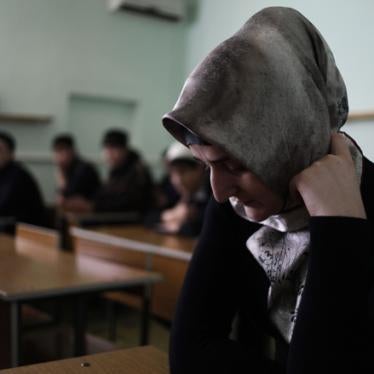On April 20 Human Rights Watch and three Russian human rights organizations held a news conference in Moscow to release their joint appeal to President Medvedev on the complete failure of Chechen Republic investigative authorities to deal with abductions of Chechnya residents by local law enforcement and security agencies.
-----
Dear President Medvedev,
Our organizations had the honor of meeting with you in the Kremlin last spring to discuss a range of pressing concerns regarding the North Caucasus. Among the issues that we discussed was the human rights situation in the Chechen Republic of the Russian Federation.
Our representatives stressed the nearly absolute impunity for egregious human rights violations, such as abductions, enforced disappearances, torture, and extrajudicial killings - by members of the local law enforcement and security agencies. We greatly appreciated your attention to our presentations and were especially inspired by your promise to look closely into our detailed written submissions and issue specific presidential directives to the appropriate ministries and agencies to address these issues.
Eleven months have passed since our meeting and regrettably, there are no positive developments. Not a single one of the violations described above has been effectively investigated. Yet we wish to underscore that our position on this issue is apparently consistent with that of the leadership of the governmental agencies directly responsible for investigating these crimes. We are therefore brining to your attention a letter from the Investigative Directorate of the Investigative Committee (SU SK) under the Russian Federation Prosecutor's Office for the Chechen Republic and a letter from the Deputy Prosecutor General of the Chechen Republic (please find them enclosed).
The first letter, dated August 2010, was sent to R. Sh. Alkhanov, Minister of Internal Affairs for the Chechen Republic, by V.A. Ledenev, head of the SU SK under the Russian Federation Prosecutor's Office for the Chechen Republic. This document clearly states that the Investigative Committee is not able fulfill its mandate to investigate crimes due to systematic sabotage of its efforts by Chechnya's law enforcement servicemen. Ledenev notes, "insufficient operational support was provided on criminal investigations (into the kidnappings of residents of the Chechen Republic in 2009-2010), and investigative missions and requests for information were delayed, incomplete, and did not provide answers to the questions asked." Ledenev points out many instances where Chechen law enforcement officials failed to act on legal demands by investigators to look into crimes. Ledenev notes that police officials "fail to carry out properly the operations relevant to the criminal cases [of abductions in Chechnya in 2009-2010]; instructions to implement operational and search measures, and requests from investigators of the investigative directorate are fulfilled incompletely and with no respect for the time-limits defined by the current legislation; and the responses [provided by them to the queries of investigators] mostly bear a purely formal character and do not contain the requested data. In his letter to Alkhanov, Ledenev also emphasizes the "poor organization" of police work and the "perfunctory approach" of police officials to their duties, which..."negatively affect the detection and investigation of criminal offences classified as serious and particularly serious."
In March 2011 N.A. Khabarov, Deputy Prosecutor of the Chechen Republic, sent a letter to the head of the Committee Against Torture, a nongovernmental organization, I.A. Kalyapin. In this letter, Khabarov describes the impotence of the Prosecutor's Office and Investigative Committee when working on abduction cases in Chechnya:
"The investigative authorities fail to carry out urgent investigative actions and organize proper cooperation with the operational services in order to solve crimes. In fact, top-ranking officials of the Investigative Committee have no departmental control over criminal investigations. No concrete steps are taken to eliminate the violations of law identified by the agencies of the prosecutor's office. The perpetrators are not held accountable. There have been cases where crimes linked to the abductions of people were actually concealed by investigators of the Investigative Directorate of the Investigative Committee for the Chechen Republic under the Prosecutor's Office of the Russian Federation... As a result of delayed initiation of criminal proceedings and inactive and passive nature of investigations, the perpetrators flee and the whereabouts of the affected [abducted] persons are not established."
Dear Mr. President!
Until now, our organizations have actively cooperated with the Prosecutor's Office and Investigative Committee in the hope of securing effective investigation into specific abduction cases in Chechnya, release of the victims, and accountability for the perpetrators. However, the documents quoted above demonstrate the systematic sabotage of investigation by Chechen law enforcement agencies and the inability of the Investigative Committee to fulfill its direct mandate to investigate crimes. As this situation is completely unacceptable, we strongly believe that as the highest-ranking official in the Russian Federation you should take exhaustive measures to uphold the law on the territory of the Russian Federation.
Lyudmila Alekseeva, Chair of the Moscow Helsinki Group
Igor Kalyapin, Chair of the Committee Against Torture and coordinator of the Independent Mobile Group of Human Rights Organizations in Chechnya
Tanya Lokshina, Russia Researcher for Human Rights Watch
Oleg Orlov, representative of The Human Rights Centre "Memorial"
Svetlana Gannushkina, Chair of the Civic Assistance Committee







